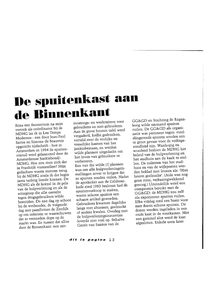De 1e prijs vanuit de opleiding Maatschappelijk Werk en Dienstverlening ging naar Kim de Graaf. Zij schreef een mooi en actueel artikel over recreatief drugsgebruik onder jongeren. Dat drugsgebruik is niet zonder risico’s. Volgens Kim kunnen jongerenwerkers een rol spelen in de begeleiding van jongeren die experimenteren met drugs én in de preventie ervan. “Op dit moment is er geen preventieve aanpak als het gaat om het gebruik van drugs, de nadruk ligt nu vooral op het voorkomen van gezondheidsschade bij jongeren”, schrijft Kim.
DOCUMENT
Podcast over allerlei aspecten van drugsgebruik
LINK
Stukje over de spuitomruil bij de MDHG in Amsterdam.
DOCUMENT

Presentatie van onderzoeksproject: ritalingebruik onder studenten van de Academie Sociale Studies (Hanzehogeschool).
MULTIFILE

In dit artikel worden de resultaten gepresenteerd van een kleinschalig en lokaal onderzoek naar de veronderstelde acceptatie en het gebruik van cannabis onder 142 Nederlandse (referentie) en 334 internationale studenten die in Nederland studeren
LINK
Dit boek geeft ouders richtlijnen voor de omgang met hun kind met suikerziekte. Het geeft praktische informatie over zaken als alcohol en drugsgebruik door tieners, adviezen voor de omgang met leerkrachten, over wat te vertellen bij een sollicitatie.
DOCUMENT
Relaties, seks, alcohol en drugsgebruik. Het zijn onderwerpen waarover jongeren vaak vragen hebben, maar die ze niet makkelijk bespreken. Dat geldt vooral voor migrantenjongeren. Op basis van drie onderzoeken van het lectoraat Leefwerelden van Jeugd vatten Mieke van Heerebeek en Veerle Knippels samen met wie en hoe migrantenjongeren 'lastige' onderwerpen bespreken. En worden suggesties gedaan welke ondersteunende rol Centra voor Jeugd & Gezin hierin kunnen vervullen.
DOCUMENT